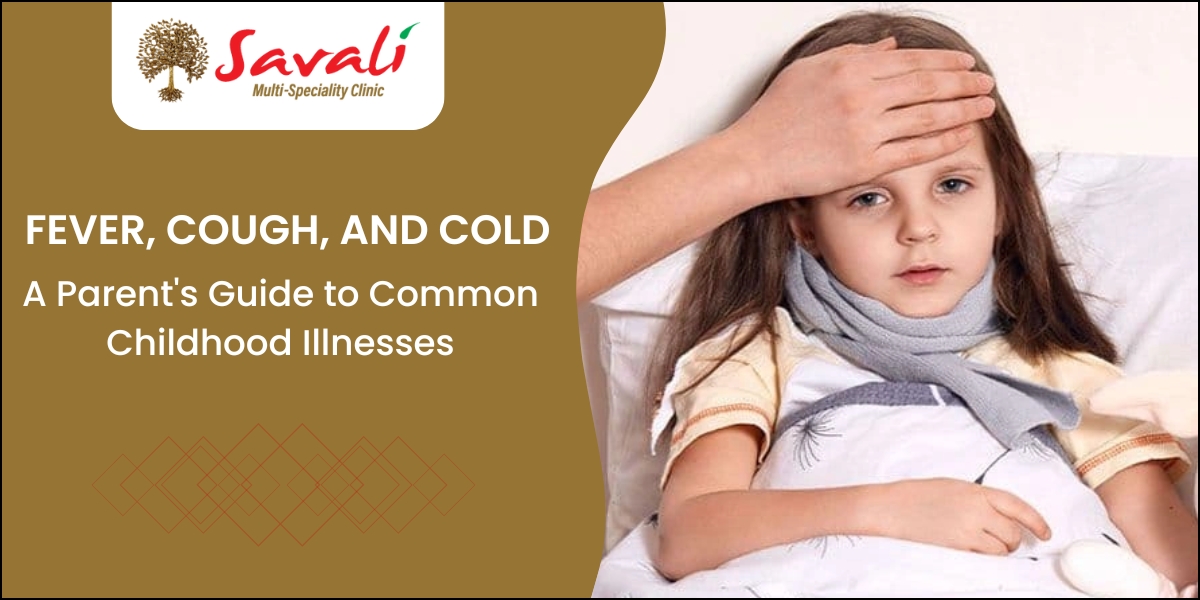As a parent, few things are more worrying than hearing your child’s cough in the middle of the night or feeling the heat of a fever on their forehead. Fever, cough, and the common cold are inevitable parts of childhood, but knowing how to respond can make all the difference.
Understanding the Symptoms
It’s important to remember that a fever, cough, and cold are not diseases themselves; they are symptoms of your child’s body fighting off an infection, usually a virus.
-
Fever: A fever is the body’s natural defense mechanism, making it a less hospitable environment for germs. A temperature above 100.4°F (38°C) is generally considered a fever.
-
Cough: A cough is a reflex to clear the airways of mucus, irritants, or microbes. It can be dry and hacking or wet and phlegmy.
-
Cold: Caused by viruses, a cold typically brings a runny or stuffy nose, sneezing, and sometimes a sore throat and cough.
Effective Home Care Strategies
Most childhood illnesses can be managed comfortably at home with supportive care. Here’s what you can do:
-
Keep Them Hydrated: Offer plenty of fluids like water, clear broth, or oral rehydration solutions. This helps thin mucus and prevents dehydration from fever.
-
Ensure Rest: Rest gives the immune system the energy it needs to fight the infection.
-
Use a Humidifier: A cool-mist humidifier in your child’s room can moisten the air, easing a stuffy nose and cough.
-
Saline Drops: For infants with a stuffy nose, saline nasal drops can loosen mucus, followed by gentle suction with a bulb syringe.
-
Comfort Measures: A lukewarm sponge bath can help reduce a fever and make your child more comfortable. Dress them in light clothing.
Important Note: Always consult your pediatrician before giving any over-the-counter cold or cough medicine, especially to children under four.
When to Call the Pediatrician
While most cases are mild, certain symptoms warrant a call to your doctor. Seek medical advice if your child:
- Is under 3 months and has a fever.
- Has a fever above 104°F (40°C) or a fever that lasts more than 3 days.
- Shows signs of dehydration (fewer wet diapers, no tears when crying, sunken eyes).
- Has difficulty breathing or is breathing rapidly.
- Is unusually lethargic, irritable, or confused.
- Has a cough that is severe, persistent, or accompanied by a “whooping” sound.
Trusted Pediatric Care in Hadapsar
Navigating your child’s health can be challenging, but you don’t have to do it alone. Consult Dr. Indrajeet Thorat, a dedicated Pediatrician in Hadapsar at Savali Multispeciality Clinic. We provide complete care for all common childhood illnesses, from routine check-ups to managing fevers, coughs, and colds.
Frequently Asked Questions (FAQs)
1. What is a dangerous fever for a child?
A fever above 104°F (40°C) is considered high and requires a call to the doctor. For infants under 3 months, any fever of 100.4°F (38°C) or higher requires immediate medical attention.
2. How to break a fever in a child naturally?
Keep them hydrated, dress them in light clothing, and use a lukewarm sponge bath. Ensure they get plenty of rest. Always monitor their temperature and comfort level.
3. When should I worry about my child’s cough?
Worry if the cough is accompanied by difficulty breathing, a high fever, a “whooping” sound, or if it causes vomiting or interferes with sleep and eating for an extended period.
4. How long does a common cold last in kids?
Most colds in children last about 7 to 10 days. The cough may sometimes linger for a bit longer, even after other symptoms have cleared.
5. Can teething cause fever and cough?
Teething might cause a slight rise in body temperature (under 100.4°F), but it does not cause a true fever, cough, or cold. These symptoms are likely due to a coincidental illness.

